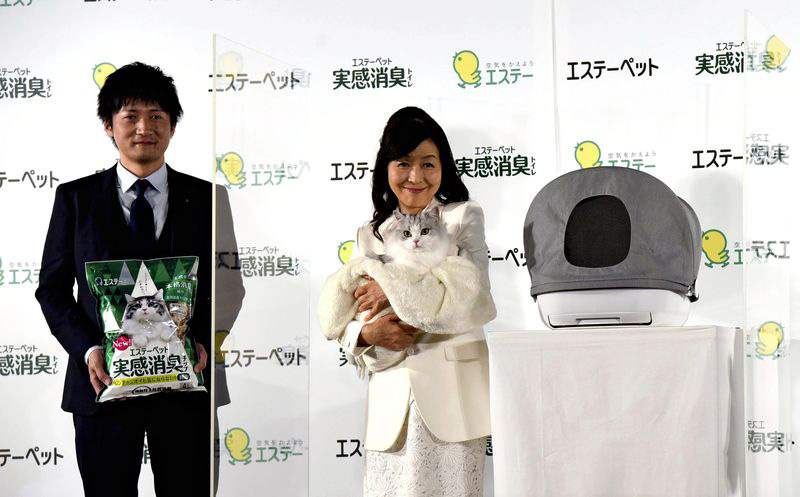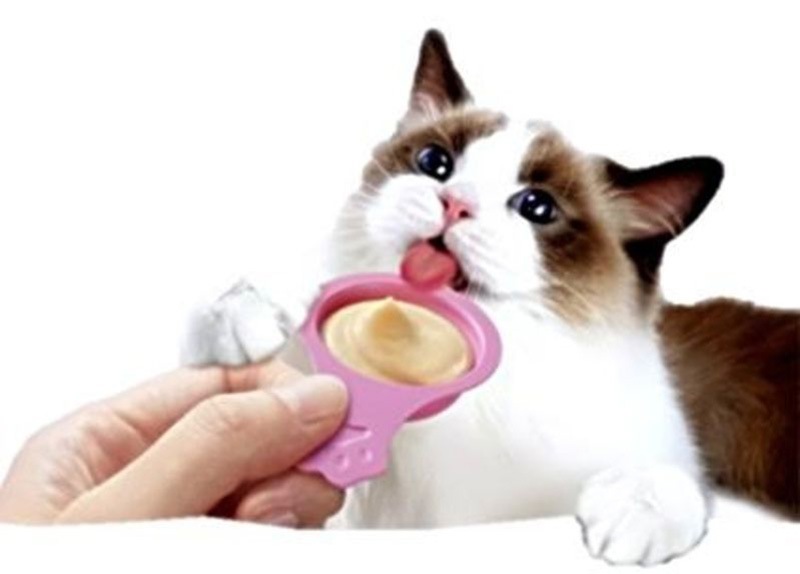
S.T. Co. has launched a kitty litter that draws on the company’s expertise in deodorants.
10:23 JST, February 28, 2022
Cats have become a popular companion as people spend more time at home amid the prolonged COVID-19 pandemic, and manufacturers are taking advantage of the trend. In 2022, the economic effect of “Nekonomics,” or cat economics, is expected to reach almost ¥2 trillion.
Feb. 22 is Cat Day, as the Japanese word for two, or “ni,” sounds similar to a cat’s cry of “nyan” (meow). This year’s Cat Day was seen as particularly special, since 2022 brought the total number of twos in the date to six.
Insect repellent and deodorant maker S.T. Corp. entered the pet products business on Cat Day this year with the launch of kitty litter that includes a deodorant component extracted from Sakhalin fir.
S.T. is a latecomer to the pet market, but it aims to secure a 10% share of related products in five years. Many owners worry about the smell of waste when they keep cats, and deodorization is the main point of competition related to pet items.

Unicharm Corp.’s spoon-shaped cat food container “Nyan Spoon”
Unicharm Corp., which boasts strong sales of disposable diapers and high-priced menstrual products, has joined the fray, making use of its technology in nonwoven textiles and absorbers. Sales in its pet care division rose 9% in the year to December 2021 from the previous 12-month period.
In addition to cat diapers, Unicharm plans to increase its lineup of items such as snacks that come in a spoon-shape container to help owners feed their cats smoothly.
“Sales in our pet business surpassed ¥100 billion for the first time, with both revenue and profits up, and the growth was driven by cat products,” President Takahisa Takahara said.
Unicharm plans to strengthen its overseas operations as well.
According to the Japan Pet Food Association, there were an estimated 16 million pet dogs and cats in Japan in 2021. The number of dogs was on the decline at about 7.1 million, while cats were gradually increasing at about 8.9 million. Many people have started keeping cats as a way to deepen inter-family interaction amid the pandemic.
Research firm Fuji Keizai Co. said the domestic market for pet-related products totaled ¥503.4 billion in 2020. It expects growth of 7.9% in 2023, compared to 2020.
Kansai University Professor Emeritus Katsuhiro Miyamoto pegged the Nekonomics economic effect of cats in 2022 at ¥1.97 trillion, estimating expenses related to keeping a cat, as well as related areas such as cat cafes, photo albums and travel to see cats.
“Products for indoor breeding are expected to expand,” said Mitsubishi UFJ Research and Consulting Co.’s Ryoichi Okubo, a pet business expert. “The key seems to be how to attach added values, such as health.”
Top Articles in Business
-

Prudential Life Insurance Plans to Fully Compensate for Damages Caused by Fraudulent Actions Without Waiting for Third-Party Committee Review
-

Narita Airport, Startup in Japan Demonstrate Machine to Compress Clothes for Tourists to Prevent People from Abandoning Suitcases
-

Japan, U.S. Name 3 Inaugural Investment Projects; Reached Agreement After Considerable Difficulty
-

Toyota Motor Group Firm to Sell Clean Energy Greenhouses for Strawberries
-

SoftBank Launches AI Service for Call Centers That Converts Harsh Customer Voices into Softer Voices
JN ACCESS RANKING
-

Producer Behind Pop Group XG Arrested for Cocaine Possession
-

Japan PM Takaichi’s Cabinet Resigns en Masse
-

Man Infected with Measles Reportedly Dined at Restaurant in Tokyo Station
-

Israeli Ambassador to Japan Speaks about Japan’s Role in the Reconstruction of Gaza
-

Videos Plagiarized, Reposted with False Subtitles Claiming ‘Ryukyu Belongs to China’; Anti-China False Information Also Posted in Japan






















